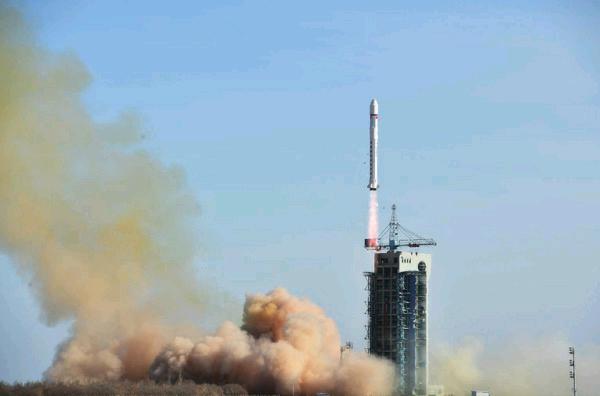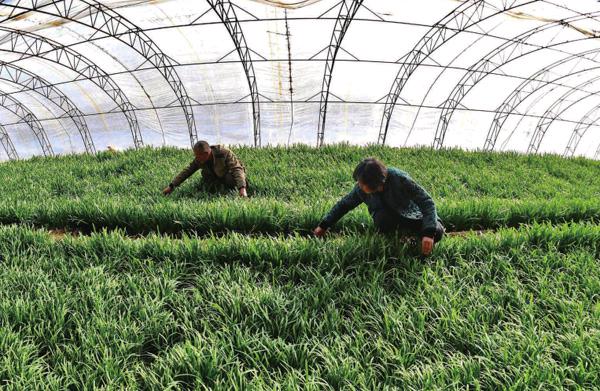Earthquake Prediction Satellite
China fi rst seismo-electromagnetic satellite Zhangheng 1 takes off from the Jiuquan Satellite Launch Center in northwest Chinas Gansu Province on February 2. The satellite was launched to study seismic precursors, which could help to establish a monitoring and forecasting network in the future.
Water Safety
All Chinese cities at the county level and above will disclose the safety conditions of drinking water this year as the country makes further efforts to curb water pollution, the environmental protection minister has announced.
The remediation of drinking water sources is among the top priorities for Chinas water pollution control in 2018, said Minister of Environmental Protection Li Ganjie.
Remediation has made headway over the past fi ve years, with a total of 490 related issues discovered in cities along the Yangtze River Economic Belt now resolved, according to the minister.
By the end of 2017, 97.7 percent of cities at the prefecture level and above had set up signs and notices drawing attention to the safety of drinking water sources.
Li said China will work to ensure that over 80 percent of the countrys water meets at least the Grade III standard by 2020.
China classifi es water quality into six grades, where Grade I is suitable for drinking after minimal treatment and Grade VI is water that is severely contaminated.
To achieve this goal, the Ministry of Environmental Protection will increase the supervision of severely polluted regions, focusing on the treatment of “black odorous water”and drinking water sources.
The ministry will push for the remediation of black odorous water in 36 major cities and the Yangtze River Economic Belt this year as well as improving environmental infrastructure, Li said.
China has passed its toughest ever Environmental Protection Law, and introduced a “river chief” system to protect water resources. Ecological red lines will also be drawn in certain regions to strengthen environmental protection, according to previous plans.
Religious Regulations
Revised regulations on religious affairs went into effect in China on February 1, curbing profi t-seeking activities by religious groups.
The updated rules remind religious groups, schools and venues of their nature as non-profi t organizations and forbid any organization or individual from profi ting through the sponsor of the building of religious venues.endprint
Groups and individuals are banned from investing in or contracting for the operation of religious venues, and they may not carry out commercial promotion in the name of religion, said the regulations.
It is also stipulated that religious groups, schools, venues and their staff should register at taxation authorities and declare their taxes.
In recent years, some temples have become too commercialized, harming the healthy development of religion and triggering corruption.
A Taoist temple in central Chinas Henan Province was shut down in November 2017 after it was found to have sought profi ts in the name of religion, according to the State Administration of Cultural Heritage.
The temple, which dates back to the Qing Dynasty (1644-1911), was renovated by a local company in 2006 and opened in 2007. It was approved by local authorities to operate as a site for Taoist activities in 2011.
Traveling Overseas
A total of 6.5 million Chinese will travel overseas during the upcoming Spring Festival holiday (February 15-21), said a report released by the China Tourism Academy and travel portal Ctrip.com.
People from more than 200 Chinese cities have booked outbound tours to over 700 cities in 68 countries and regions on Ctrip, said the report released on February 2.
The tourists are expected to spend 9,500 yuan ($1,510) each on their trips.
The most popular destinations are Thailand, Japan, Singapore and Viet Nam. The Nordic countries and the United Arab Emirates are also among the favorites, while some travelers will be going as far afi eld as Antarctica.
During the Spring Festival holiday in 2017, 6.15 million Chinese traveled overseas, up 7 percent year on year.
Maternal Mortality
Chinas maternal mortality rate contracted to 19.6 per 100,000 in 2017 from 19.9 per 100,000 the previous year, the National Health and Family Planning Commission said on February 1.
Moreover, the rate of infant mortality also dropped last year from 7.5 per thousand to 6.8 per thousand, narrowing the gap between China and the developed world.
Attributing the achievements to the maternal risk screening and treatment system, the commission called for improved maternal and infant healthcare services by allocating more resources at the grassroots level.
There should be at least one public maternal and infant healthcare institution in each county by 2020, said the commission.endprint
China plans to further reduce the maternal mortality rate to 12 per 100,000 and the infant mortality rate to 5 per thousand by 2030, according to an offi cial guideline titled Healthy China 2030.
Festive Mood
A Polish tourist tries out dragon dancing in Mingyan Village, Ningbo, east Chinas Zhejiang Province, on February 4, as 100 foreigners took part in traditional folk-custom activities in celebration of the upcoming Chinese Lunar New Year on February 16.
Paparazzi Curb
The Chinese authorities have ordered social media operators to close several high-profi le accounts accused of spreading celebrity paparazzi content considered to be of low taste.
The Cyberspace Administration of China (CAC) said on February 2 that the closure would be permanent.
“The rampant and vulgar speculation on celebrities private lives has seriously disrupted order online, sent an incorrect ideological message, affected the healthy development of the youth, and caused wide social discontent,” the regulator said in a statement.
The CAC said the campaign would continue to strengthen oversight over social media operators such as Weibo, Tencent, Baidu and Youku, while punishing entertainment companies and studios found to be in violation of the law.
The regulatory authority closed more than 6,000 websites and accounts on popular social media service WeChat for containing pornographic and indecent content in 2017. Several infl uential streaming websites were shut down and a number of live-stream hosts were detained for producing pornographic content, according to the National Offi ce Against Pornographic and Illegal Publications.
More than 4.5 million indecent posts were deleted at the request of the offi ce during the year, while online service providers removed around 20 million similar posts themselves, it said.
Forest Tourism
By the end of 2017, the number of national forest parks in China had reached 881, covering 12.8 million hectares, or about 1.3 percent of Chinas total land area, according to the State Forestry Administration (SFA).
In 2017, Chinas forest tourism industry yielded an output of 1.15 trillion yuan ($182.67 billion).
About 1.39 billion trips were made to forest and wetland parks last year, accounting for around 28 percent of trips made in China, according to the SFA.
Forests have become popular travel destinations in China over the last fi ve years, with revenue rising from 61.8 billion yuan ($9.81 billion) in 2012 to 140 billion yuan ($22.23 billion) in 2017.endprint
The number of trips to forests grew 15.5 percent annually over the past fi ve years to total 4.6 billion, and forest-themed tourism areas increased by about 1,000 sites.
The booming forest tourism industry has also helped alleviate poverty, adding 3,500 yuan ($556) per household on average for 350,000 poor families each year.
Commemorative Currency
A bank clerk displays commemorative coins for the Year of the Dog in Beijing on February 2, the day that the Peoples Bank of China issued the coins with a face value of 10 yuan ($1.59).
ICO Transactions Restricted
Chinas central bank has revealed plans to tighten regulations on the participation of domestic investorsin overseas transactions of “initial coin offerings” (ICOs) and virtual currency as risks remain high in the sector.
Overseas ICO transaction platforms pose risks including illegal offerings, false information, fraud and pyramid schemes, according to the Peoples Bank of China.
Regulators warned that domestic investors should be alert to risks and refrain from speculating on virtual currency transactions.
“ICOs, in essence, are a kind of unauthorized and illegal public fundraising and are suspected of having ties to criminal activities such as fi nancial fraud and pyramid schemes,” according to an earlier statement from the central bank.
Last September, authorities ordered a ban on ICOs and shut down all virtual currency exchanges in the country, as the rapidly expanding market triggered concerns over fi nancial risks.
Regional Vegetable Basket
Farmers cultivate leeks in a greenhouse in Zuojiawu Town, Tangshan, north Chinas Hebei Province, on February 5. As the Spring Festival approaches, pollution-free fruit and vegetables produced by more than 20,000 mu (1,333 hectares) of greenhouses in Tangshan will be transported to Beijing and Tianjin.
Loan Fraud Punished
Chinas banking regulators have imposed a fi ne of 52.5 million yuan($8.33 million) on 19 banking institutions over a fraud case involving pledge loans in Shaanxi and Henan provinces.
These lenders, including local branches of the Industrial and Commercial Bank of China, were punished for granting loans of up to 19 billion yuan ($3.02 billion) to criminals who illegally used lowpurity gold as pledges, the China Banking Regulatory Commission(CBRC) said.
The loan fraud case has exposed“numerous defects” in the internal controls and management of these institutions, which sought business expansion aggressively and blindly,“creating loopholes that criminals could exploit,” the CBRC said in a statement.endprint

